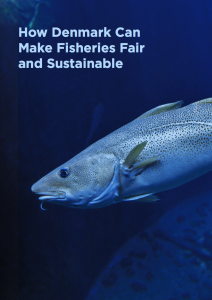Copenhagen, 30 August 2017: A report released today exploring Denmark’s role in overfishing within EU waters, finds that the country often portrayed as a green leader is delaying the environmental, social, and economic benefits that come from restoring and maintaining healthy fish stocks.
The report, How Denmark Can Make Fisheries Fair and Sustainable, co-authored by Our Fish and the New Economics Foundation, outlines how Denmark’s Government can end overfishing, address its quota scandal, and get in step with European fisheries law. Denmark can achieve this by setting fishing quotas according to scientific advice, allocating its fishing quota in a way that incentivises best environmental practices, and using national policy and the quota system to support vulnerable, low-impact fisheries during the transition to sustainable levels.
“The Danish government is the Baltic’s worst culprit when it comes to overfishing – in 2017, it topped the list of countries fishing above scientifically recommended limits, leading the public to believe that this is because of ‘socio-economics’. However, the figures tell a different story; not only would following scientific advice for fishing quotas bring higher economic returns sooner, but the current allocation of quotas benefits destructive trawlers that cause the biggest environmental impact while reaping significantly higher profits than low-impact coastal fishers,” said Our Fish Program Director Rebecca Hubbard.
 Recent controversies in Denmark have put fishing quotas both on the news agenda and at the centre of Danish politics, after the withholding of information to Parliament on available options to limit the concentration of fishing quotas resulted in Minister Esben Lunde Larsen receiving a ‘nose’ (reprimand) and the fisheries portfolio being moved to a new Ministry in August 2017 [1]. A recent auditors’ report has also confirmed that very little information exists on quota concentration altogether [2].
Recent controversies in Denmark have put fishing quotas both on the news agenda and at the centre of Danish politics, after the withholding of information to Parliament on available options to limit the concentration of fishing quotas resulted in Minister Esben Lunde Larsen receiving a ‘nose’ (reprimand) and the fisheries portfolio being moved to a new Ministry in August 2017 [1]. A recent auditors’ report has also confirmed that very little information exists on quota concentration altogether [2].
Western Baltic Cod stocks have spend years teetering on the edge of collapse, yet Denmark has consistently set fishing limits above scientific advice (3,4). Danish officials will welcome representatives from all EU Baltic states at BALTFISH in Copenhagen this week to discuss their position on Baltic fishing quotas for 2018. Advice from the trawl industry-dominated Baltic Sea Advisory Council is pushing for western Baltic cod fishing quotas to be more than 3,000 tonnes above the upper end of scientific advice (5).
“With the latest scandal around quota management in Denmark, it appears that a stone has been left unturned, and discussion is now forming around how fishing quota should be managed in the public interest”, continued Hubbard. “Just as fishing limits should be sustainable, they should also be fair. Now is the time for the new Danish fisheries minister Karen Ellemann to seize the opportunity to both set fishing quotas at sustainable levels, and change the quota allocation system to prioritise low-impact coastal fishers, and better ensure their economic viability and ecological sustainability”.
The report, How Denmark Can Make Fisheries Fair and Sustainable can be downloaded from http://bit.ly/DKBaltic2017en
END
NOTES:
Jobs, vessels and quota numbers from Table 1 in the released report.
- CPH Post Online. (2017). Minister stripper of fishing duties. Retrieved from: http://cphpost.dk/news/minister-stripped-of-fishing-duties.html
- CPH Post Online. (2017). Police called in by auditors over fish quota irregularities. Retrieved from: http://cphpost.dk/news/police-called-in-by-auditors-over-fish-quota-irregularities.htm
- Western Baltic cod has been overfished for a number of years, so that even after a strong 2016 year class, stocks are still at the second lowest biomass levels since the early 1980s, and outside of safe limits for repopulating to a healthy state. ICES (2017), ICES Advice on fishing opportunities, catch, and effort, Baltic Sea Ecoregion. Published 31 May 2017. Cod.27.22-24
- New Economics Foundation (2017), Landing the Blame – Overfishing in the Baltic 2017.
- BSAC recommendations for the fishery 2018, retrieved from http://bsac.dk/BSAC-Resources/BSAC-Statements-and-recommendations/BSAC-recommendations-for-the-fishery-2018
Contacts
Dave Walsh, Communications Advisor, dave@our.fish +34 691826764
Rebecca Hubbard, Program Director, rebecca@our.fish +34 657669425
About Our Fish
Our Fish works to ensure European member states implement the Common Fisheries Policy and achieve sustainable fish stocks in European waters.
Our Fish works with organisations and individuals across Europe to deliver a powerful and unwavering message: overfishing must be stopped, and solutions put in place that ensure Europe’s waters are fished sustainably. Our Fish demands that the Common Fisheries Policy be properly enforced, and Europe’s fisheries effectively governed.
Our Fish calls on all EU Member States to set annual fishing limits at sustainable limits based on scientific advice, and to ensure that their fishing fleets prove that they are fishing sustainably, through monitoring and full documentation of their catch.
